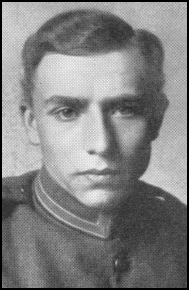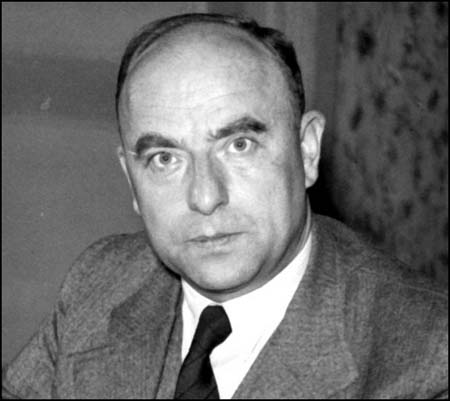Otto Strasser

Otto Strasser, the brother of Gregor Strasser, was born in Bad Windsheim, Germany, on 10th September, 1897. At the age of seventeen he joined the German Army as a volunteer. During the First World War he was wounded on two different occasions. By 1918 he had reached the rank of lieutenant.
In 1919 he joined the Freikorps and helped to put down the Bavarian Soviet Republic which was organized on the principles of workers' councils. He eventually became disillusioned with the extreme right and became a member of the Social Democratic Party. In 1920 he joined the socialists in the opposition to the Kapp Putsch.
In 1924 he joined forces with his brother, Gregor Strasser, to establish the Berliner Arbeiter Zeitung, a left-wing newspaper, that advocated world revolution. It also supported Lenin and the Bolshevik government in the Soviet Union. The following year Strasser saw Adolf Hitler make a speech. He later recalled in Hitler and I (1940): "Adolf Hitler enters a hall. He sniffs the air. For a minute he gropes, feels his way, senses the atmosphere. Suddenly he bursts forth. His words go like an arrow to their target, he touches each private wound on the raw, liberating the mass unconscious, expressing its innermost aspirations, telling it what it most wants to hear. If he tries to bolster up his argument with theories or quotations from books he has only imperfectly understood, he scarcely rises above a very poor mediocrity. But let him throw away his crutches and step out boldly, speaking as the spirit moves him, and he is promptly transformed into one of the greatest speakers of the century.... Hitler responds to the vibrations of the human heart with the delicacy of a seismograph, or perhaps of a wireless receiving set, enabling him, with a certainty with which no conscious gift could endow him, to act as a loud-speaker proclaiming the most secret desires, the least admissible instincts, the sufferings and personal revolts of a whole nation. But his very principle is negative. He only knows what he wants to destroy. He pulls down the walls without any idea of what he will build in their place."
Otto Strasser now joined the National Socialist German Workers Party (NSDAP). However, Adolf Hitler was highly suspicious of the brothers and disapproved of their socialist views. On 14th February, 1926, at the NSDAP annual conference, Gregor Strasser called for the destruction of capitalism in any way possible, including cooperation with the Bolsheviks in the Soviet Union. At the conference Joseph Goebbels supported Strasser but once he realised the majority supported Hitler over Strasser, he changed sides. From this point on Strasser began to call Goebbels "the scheming dwarf".
Strasser objected to the lack of democracy in the party. Hitler apparently replied: "You would give every Party member the right to decide on the idea - even to decide whether the leader is true to the so-called idea or not. This is democracy at its worst, and there is no place for such a view with us. With us the Leader and the Idea are one, and every Party member has to do what the leader orders. The Leader incorporates the Idea and alone knows its ultimate goal. Our organization is built up on discipline. I have no wish to see this organization broken up by a few swollen-headed litterateurs."
His biography, Louis L. Snyder, pointed out: "On May 21, 1930, Hitler demanded a showdown. Otto Strasser would have to submit completely to party discipline and do as he was told. He refused, whereupon Hitler ordered Goebbels to expel him and his friends from the party." Claiming that he was the true National Socialist, Otto Strasser formed a splinter party, the Union of Revolutionary National Socialists (The Black Front). Strasser now attacked Hitler as "the betrayer of the revolution". Strasser was never able to gain much voting strength and when Hitler gained power he fled to Prague.

After Adolf Hitler became Chancellor of Germany industrialists such as Albert Voegler, Gustav Krupp, Alfried Krupp, Fritz Thyssen and Emile Kirdorf, who had provided the funds for the Nazi victory, were unhappy with people such as Gregor Strasser and Ernst Roehm, who argued that the real revolution had still to take place. Many people in the party also disapproved of the fact that Roehm and many other leaders of the SA were homosexuals.
On 29th June, 1934. Hitler, accompanied by the Schutzstaffel (SS), arrived at Bad Wiesse, where he personally arrested Ernst Roehm. During the next 24 hours 200 other senior SA officers were arrested on the way to the meeting. Erich Kempka, Hitler's chauffeur, witnessed what happened: "Hitler entered Roehm's bedroom alone with a whip in his hand. Behind him were two detectives with pistols at the ready. He spat out the words; Roehm, you are under arrest. Roehm's doctor comes out of a room and to our surprise he has his wife with him. I hear Lutze putting in a good word for him with Hitler. Then Hitler walks up to him, greets him, shakes hand with his wife and asks them to leave the hotel, it isn't a pleasant place for them to stay in, that day. Now the bus arrives. Quickly, the SA leaders are collected from the laundry room and walk past Roehm under police guard. Roehm looks up from his coffee sadly and waves to them in a melancholy way. At last Roehm too is led from the hotel. He walks past Hitler with his head bowed, completely apathetic."
A large number of the SA officers were shot as soon as they were captured but Adolf Hitler decided to pardon Roehm because of his past services to the movement. However, after much pressure from Hermann Goering and Heinrich Himmler, Hitler agreed that Roehm should die. At first Hitler insisted that Roehm should be allowed to commit suicide but, when he refused, Ernst Roehm was killed by two SS men.
On 30th June 1934 Gregor Strasser was arrested by the Gestapo as part of the purge of the socialists. He was taken to Gestapo Headquarters where he was shot in the back of the head. The purge of the SA was kept secret until it was announced by Hitler on 13th July. It was during this speech that Hitler gave the purge its name: Night of the Long Knives (a phrase from a popular Nazi song). Hitler claimed that 61 had been executed while 13 had been shot resisting arrest and three had committed suicide. Others have argued that as many as 400 people were killed during the purge. In his speech Hitler explained why he had not relied on the courts to deal with the conspirators: "In this hour I was responsible for the fate of the German people, and thereby I become the supreme judge of the German people. I gave the order to shoot the ringleaders in this treason."
While he was in exile he wrote a book on the socialist purge. In 1940 he moved to Bermuda where he published, Hitler and I. The following year he emigrated to Canada. His books attacking the Nazis upset Joseph Goebbels who described Strasser as "Public Enemy Number One" and a price of $500,000 was set on his head. In 1955 Strasser returned to Germany.
Otto Strasser died in Munich on 27th August, 1974.
Primary Sources
(1) Otto Strasser, Hitler and I (1940)
Adolf Hitler enters a hall. He sniffs the air. For a minute he gropes, feels his way, senses the atmosphere. Suddenly he bursts forth. His words go like an arrow to their target, he touches each private wound on the raw, liberating the mass unconscious, expressing its innermost aspirations, telling it what it most wants to hear....
Hitler responds to the vibrations of the human heart with the delicacy of a seismograph, or perhaps of a wireless receiving set, enabling him, with a certainty with which no conscious gift could endow him, to act as a loud-speaker proclaiming the most secret desires, the least admissible instincts, the sufferings and personal revolts of a whole nation...
I have been asked many times what is the secret of Hitler's extraordinary power as a speaker. I can only attribute it to his uncanny intuition, which infallibly diagnoses the ills from which his audience is suffering.... But his very principle is negative. He only knows what he wants to destroy. He pulls down the walls without any idea of what he will build in their place.
Student Activities
Adolf Hitler's Early Life (Answer Commentary)
Adolf Hitler and the First World War (Answer Commentary)
Adolf Hitler and the German Workers' Party (Answer Commentary)
Adolf Hitler and the Beer Hall Putsch (Answer Commentary)
Adolf Hitler the Orator (Answer Commentary)
British Newspapers and Adolf Hitler (Answer Commentary)
An Assessment of the Nazi-Soviet Pact (Answer Commentary)
Lord Rothermere, Daily Mail and Adolf Hitler (Answer Commentary)
Heinrich Himmler and the SS (Answer Commentary)
Adolf Hitler v John Heartfield (Answer Commentary)
The Hitler Youth (Answer Commentary)
German League of Girls (Answer Commentary)
Night of the Long Knives (Answer Commentary)
The Political Development of Sophie Scholl (Answer Commentary)
The White Rose Anti-Nazi Group (Answer Commentary)
Kristallnacht (Answer Commentary)
Trade Unions in Nazi Germany (Answer Commentary)
Hitler's Volkswagen (The People's Car) (Answer Commentary)
Women in Nazi Germany (Answer Commentary)
The Assassination of Reinhard Heydrich (Answer Commentary)
The Last Days of Adolf Hitler (Answer Commentary)
